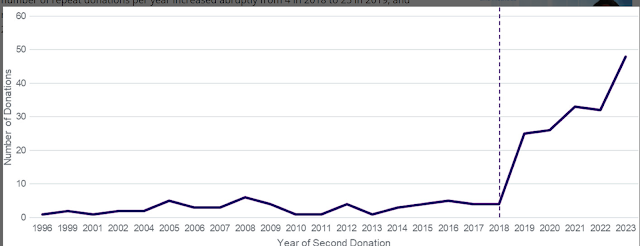I'm learning a bit about movie production by following the progress of the movie Abundant, which is about to have a pre-release premier. Here is the trailer (sponsored by the APKD), and the press release.
Here's the trailer: https://vimeo.com/1048377579
And here's the press release:
LOS ANGELES--(BUSINESS WIRE)--ABUNDANT, a documentary film that follows the unbelievable events surrounding extreme altruists who donated kidneys to complete strangers, has set its world premiere in Hollywood at The Directors Guild of America Theater Complex on March 1, 2025. The event is presented by OneLegacy Inspires Hollywood and The National Kidney Donation Organization (NKDO) as a kickoff to National Kidney Month. OneLegacy Inspires Hollywood champions authentic and accurate storytelling that highlight the power of organ, eye and tissue donation and transplantation.
“ABUNDANT moves us beyond a mindset of scarcity, reminding us of our shared humanity and connection”
The film’s world premiere is an entertainment industry event to showcase the often-miraculous stories connected to altruistic acts such as living kidney donation. “ABUNDANT moves us beyond a mindset of scarcity, reminding us of our shared humanity and connection,” said Sarah E. Fahey, Chair of OneLegacy Inspires Hollywood. “Through a powerful emotional journey of joy, grief, and hope, the film keeps audiences engaged from start to finish—and lingers long after the credits roll. OneLegacy Inspires Hollywood is thrilled to partner with NKDO and Maitri River Productions to premiere this impactful story during National Kidney Month here in Hollywood. This is the movie Los Angeles, and the world, needs right now,” Fahey added.
The choice of Los Angeles for ABUNDANT’s world premiere was in part inspired by the widespread acts of generosity, kindness and abundance displayed by the Los Angeles community during the recent wildfires. “One thing became obvious to me about abundance and altruism when I was making ABUNDANT,” said Director Donald Griswold. “Acts of abundance or generosity don’t have to be life-saving or dramatic to impact another person’s life meaningfully. We’re all fascinated by the non-directed kidney donors who give a kidney to a stranger, but viewers walk away from the film realizing that small acts and everyday kindnesses make an important impact, too. We saw that in so many ways in LA these last few weeks. We had to show ABUNDANT for the first time here and now.”
National Kidney Donation Organization supports ABUNDANT as part of an effort to gain more attention for kidney donation stories. “We are proud to have a hand in sharing this life-affirming message of hope and goodness with the people of LA, and with all those across the country who might be inspired by it,” said Emily Polet-Monteserro, Executive Director, National Kidney Donation Organization. “This compelling film uses the vehicle of kidney donation to encourage the audience to consider what it means for them to live fully and with love toward everyone, including strangers.”
ABUNDANT includes interviews with 2012 Nobel Prize Laureate Alvin Roth, PhD, Freakonomics Radio host Stephen Dubner, author and researcher Abigail Marsh, PhD, and business leader in the field of system change, Tynesia Boyea-Robinson among other notable personalities. The film features first-hand stories of non-directed kidney donation (where a person donates a kidney to a complete stranger) in a never-before-seen way of telling stories.
#############
Earlier:




